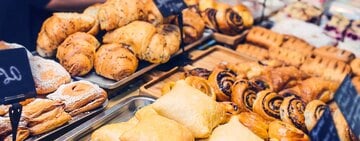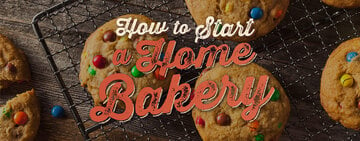
Finding the best bakery equipment can be daunting, whether you've owned a bakery for years or are just starting in the industry. It represents a significant investment, and you’ll want to get the most for your money. Before purchasing, consider your menu, expected output, and preferred baking styles. To help guide you through the purchasing process, we’ve provided a list of essential bakery equipment and a downloadable checklist below:
Download Checklist PDFDough Prep Equipment
Dough preparation is the cornerstone of creating delicious baked goods, and having the right equipment is a key factor for achieving the perfect texture and quality in your signature products. While small, artisan-style bakeries may opt for hand mixing, most commercial bakeries invest in commercial dough prep equipment to enhance output and consistency. To streamline your dough preparation process and achieve optimal results, there are several key appliances that you should consider investing in.
Commercial Mixers

Commercial mixers, sometimes called planetary mixers, can mix batters, whip eggs, knead dough, and complete a wide range of other kitchen tasks. They come in a variety of sizes, ranging from 5 qt. countertop models up to 100+ qt. floor units. Depending on your needs, you can choose from mixers with different styles, lift types, and speeds. Mid to large-size bakeries may choose to have several floor units, while smaller operations might benefit from a countertop unit's portable nature, which will lend itself to mixing up small batches of icing or fillings quickly and easily.
- Best for: General mixing tasks
Dough Dividers and Sheeters

Dough dividers are specialized pieces of commercial bakery equipment that take a large batch of dough and portion it into equally sized and weighted balls. They ensure consistent results when making pies, bread, or pizza crusts. Dough sheeters take that ball of dough, roll it, and stretch it to the size and thickness you desire. These types of equipment can be bulky and expensive, and while they can be great labor cost savers for high-volume establishments, they may not be the best investment for smaller, independent bakeries.
- Best for: High-volume dough prep
Holding and Proofing Cabinets

Because dough rises best in warm, humid environments, holding and proofing cabinets are excellent investments. These specialized units achieve the perfect temperature and humidity levels for consistent, repeatable dough. They come in many styles and sizes, giving you options. You can purchase cabinets that are strictly designed for proofing bread dough or models that also boast a hot holding function. If you're short on space, consider buying combination holding and proofing cabinets, which give you the versatility of two pieces of equipment in a single footprint.
- Best for: High-volume dough prep
Retarders and Proofers

If you wish to slow down the rising of your dough, you can refrigerate it. But, some types of dough turn out best when they're allowed to rest at higher temperatures. In this case, you may want to consider a retarder. The most versatile retarders are combination units that will switch over to proofing the dough when you're ready to do so. You can put your dough in overnight, program the machine to start proofing them at a certain time, and have them proofed and ready for baking exactly when you're ready. Some specialized models even combine the retarder/proofer and convection oven capabilities into one unit.
- Best for: Controlling the rise of dough
Baking Equipment
The heart of any bakery is its oven. They come in many shapes, sizes, and styles, allowing you to identify which model best fits the needs of your establishment. Consider what kinds of baked goods you plan to offer, the quantity you expect to sell, and the space in your kitchen when looking for an oven. Remember that no matter what oven you install, you'll almost always need to keep it under a ventilation hood.
Convection Ovens

Convection ovens are one of the most common pieces of commercial bakery equipment. They do a great job of quickly baking, using internal fans to circulate the air and create even browning. Of the ovens typically used in a bakery, a convection oven is the most common and least expensive. Some high-end types of convection ovens boast steam injection and other specialized features that can take your baked goods to the next level.
- Best for: Traditional baking tasks, small- and medium-sized bakeries
Deck Ovens

Artisan-style bakers or those making specific types of bread prefer a deck oven. Their stone cooking decks heat up, giving the crust a distinctive, crispy texture while maintaining a soft and moist inside. A deck oven takes up considerably more space than a convection oven, so keep that in mind if space is limited. However, due to their relatively simple design and few moving parts, they last a long time and operate without a lot of hassle. Both single-deck and multi-deck styles are available.
- Best for: Artisan baking
Roll-In Rack Ovens

A roll-in rack oven is similar in concept to a roll-in refrigerator or proofing cabinet, allowing you to wheel a pan rack full of goods into the oven for baking. Some models will grab the pan rack and rotate them during baking for even results. Because of their convenient design, these ovens are perfect for baking large quantities of goods while saving your staff time in the kitchen. They are especially popular in high-output bakeries.
- Best for: High-output baking, time saving
Revolving Ovens
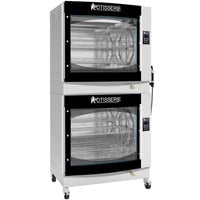
A revolving oven has large revolving trays that you can load, similar in concept to a rotisserie-style oven at a deli or market. They are perfect for preparing bagels, pizza dough, and certain types of bread. These ovens have a very high capacity and output capability but are also expensive. Because of their high price tag, you should make sure your output needs and budget can justify the investment before making a purchase.
- Best for: High-output baking
Display Equipment
A key part of any successful bakery is how you display and market your signature goods. Investing in the right display and sales equipment can set your business up for success, attracting customers and increasing impulse sales. Remember that different bakery concepts lend themselves to various displays, and you should always invest in the equipment that best fits your needs.
Bread Slicers
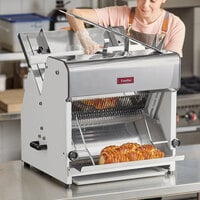
Due to their speed and consistency of cut, bread slicers are a great option if your bakery plans to sell sliced bread. Some specialized models accommodate unique baked goods such as French bread, buns, and bagels, giving you versatility in your slicing needs. These slicers come in countertop and floor varieties, allowing you to choose the one that best fits your bakery layout and production volume. Additionally, bread slicers can be purchased for a wide range of slice sizes, ensuring you can offer your customers the perfect thickness of bread slices for their preferences.
- Best for: Bread bakeries
Bakery Display Cases
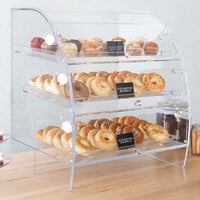
If you have plans for a large retail component in your bakery, you'll want to consider what types of bakery display cases you will need. Both refrigerated and non-refrigerated styles are available, depending on the type of products you plan on selling. Likely, you'll want a mix of both. You will also have to decide whether you want a self-serve display case or one designed for serving customers from behind the counter.
- Best for: Most commercial bakeries
Back to Top
Finding the best commercial bakery equipment is just one step in starting a business. In addition to heavy equipment, be sure to stock up on tools like bread knives and other smallwares. By investing in the right equipment and supplies, you can position your business for success.



